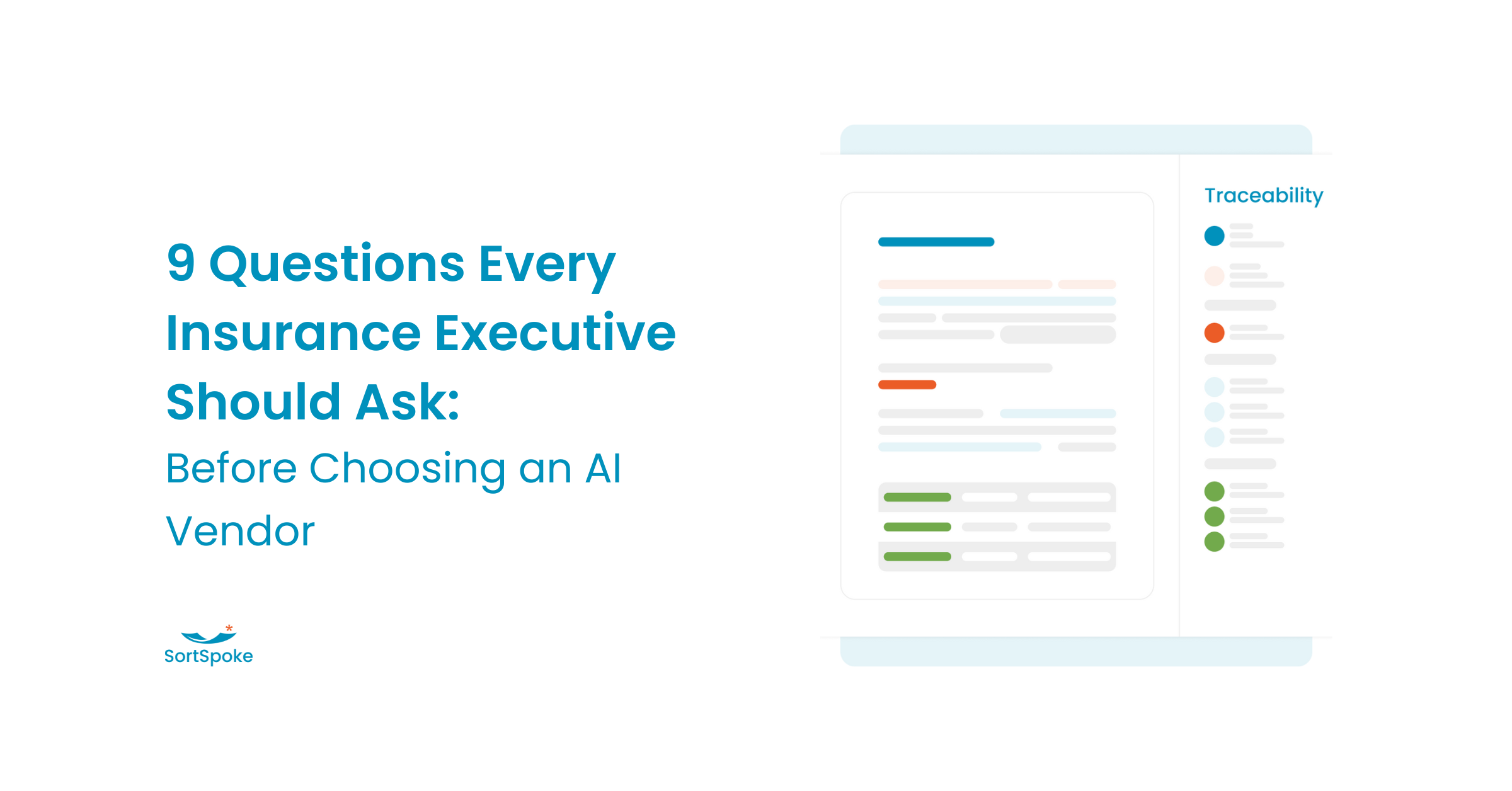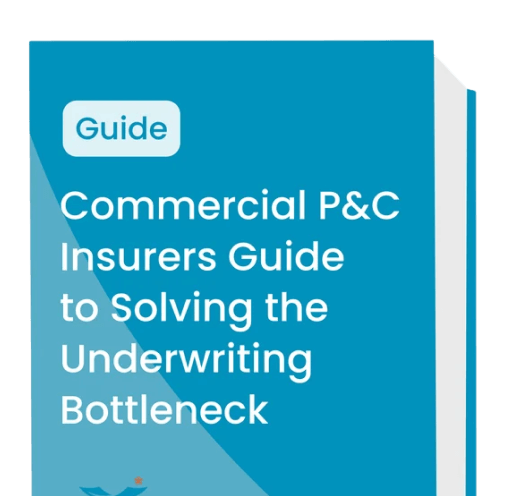9 Questions Every Insurance Executive Should Ask Before Choosing an AI Vendor

Published August 12, 2025 | Updated February 12, 2026
TL;DR
- AI vendor selection requires strategic due diligence — not just flashy demos and promises
- Integration complexity and data security are make-or-break factors for insurance implementations
- Regulatory compliance and auditability must be built into the AI system from day one
- Total cost of ownership extends far beyond licensing fees to include implementation, training, and scaling costs
- Human-in-the-loop approaches that enhance underwriter expertise deliver better results than replacement models
- Vendor partnership quality matters as much as technology — choose partners who understand insurance deeply
- Scalability during peak periods like CAT season is critical for maintaining performance under pressure
The insurance industry stands at a crossroads. AI promises to transform everything from underwriting speed to claims accuracy, but the gap between vendor promises and real-world results can be enormous. Every week, insurance executives sit through polished demos showcasing "revolutionary" AI capabilities, only to discover months later that implementation reality looks nothing like the sales presentation.
The difference between AI success and failure often comes down to asking the right questions before you sign the contract. Not the questions vendors want to answer — the ones that reveal whether their solution will actually work in your environment, with your data, under your regulatory requirements.
After working with dozens of insurance carriers implementing AI-powered document processing, we've seen what separates successful deployments from expensive mistakes. The executives who get AI right ask these nine critical questions before making any vendor commitments.
1. Will it actually solve my business problem — and how quickly?
Stop accepting vague promises about "digital transformation." Demand specific, measurable improvements to your actual workflows.
The best AI vendors don't just tell you their technology is innovative — they show you exactly how it addresses your specific pain points. Look for vendors who can articulate clear use cases like reducing quote turnaround from days to hours, improving claims cycle times by 40%, or achieving 80%+ straight-through processing rates for routine submissions.
But speed of results matters just as much as the results themselves. Some AI implementations take 18-24 months to show meaningful impact. Others deliver value within weeks. Ask for proof from similar carriers, not theoretical projections.
2. Can you integrate with what I already have?
Your core systems aren't going anywhere. Make sure the AI can work with them seamlessly.
Integration complexity kills more AI projects than technical limitations. Insurance carriers have spent millions building their technology infrastructure — PAS systems, claims platforms, CRMs, data warehouses. The right AI solution works with what you have, not against it.
Ask about specific integration points: How does data flow between the AI and your existing systems? What APIs are required? How much custom development work will your IT team need to handle? Most importantly, what's the realistic implementation timeline — not the best-case scenario from the sales deck.
3. How will you protect my data and reputation?
Insurance data requires military-grade security. Anything less puts your entire organization at risk.
You handle personally identifiable information, protected health information, and financial data every single day. A data breach isn't just expensive — it can destroy decades of customer trust. Your AI vendor must demonstrate enterprise-grade security that meets or exceeds your current standards.
Critical questions include: Where is data stored and processed? Is it encrypted in transit and at rest? Who has access to it, and how is that access controlled? What happens in the event of a breach? How do you ensure AI decisions don't create new liability exposures?
4. Will it meet regulatory and audit requirements?
Black box AI is a regulatory nightmare waiting to happen. Demand transparency and auditability.
Insurance is one of the most regulated industries in the world. Your AI systems must provide clear, auditable decision trails that satisfy regulators, auditors, and compliance teams. This means understanding not just what the AI decided, but how and why it reached that conclusion.
Look for AI that maintains detailed audit logs of every decision, provides clear explanations for automated outcomes, and includes built-in bias detection and prevention mechanisms. The system should make it easy to demonstrate compliance with fair lending laws, anti-discrimination regulations, and state insurance codes.
5. What's the total cost of ownership — and ROI?
Licensing fees are just the beginning. Factor in implementation, integration, training, and scaling costs.
AI vendors love to lead with attractive licensing numbers, but the real cost includes much more. Implementation and integration work can easily double your initial investment. Ongoing support, training, and maintenance add up over time. And scaling costs can surprise you as your usage grows.
Demand a complete breakdown: implementation costs, integration expenses, training requirements, ongoing support fees, and scaling pricing. Then ask for ROI data from similar deployments — not theoretical models, but actual results from real customers.
6. How scalable is it during peak volumes?
CAT season and market surges test every system. Make sure your AI can handle the pressure.
Insurance isn't a steady-state business. Hurricane season can generate 10x normal claim volumes overnight. Market conditions can flood underwriters with submissions during renewal periods. Your AI must maintain accuracy and speed when you need it most.
Ask about the vendor's largest production deployments.- How do they handle sudden volume spikes?
- Does processing speed or accuracy degrade as volumes increase?
- What's their experience with carriers processing 50,000+ submissions per month?
7. How will this enhance — not replace — my underwriters' expertise?
The best AI amplifies human expertise rather than replacing it. Make sure your vendor understands the difference.
Experienced underwriters bring decades of market knowledge, risk intuition, and relationship skills that no AI can replicate. The most successful AI implementations enhance these capabilities rather than trying to replace them.
Look for solutions that make your underwriters faster, more accurate, and more consistent while keeping them in control of final decisions. The AI should handle routine data extraction and processing, freeing underwriters to focus on complex risk assessment and customer relationships.
8. How does your AI handle change?
Business rules change constantly. Your AI should adapt quickly without requiring technical expertise.
Insurance markets evolve rapidly. New regulations, changing risk appetites, and market conditions require constant adjustments to underwriting guidelines. Your AI system must accommodate these changes quickly and easily.
Ask whether you can modify rules and workflows yourself, or whether every change requires vendor support. Can your underwriters and operations teams make adjustments, or do you need technical experts? How long does it take to implement new business rules?
9. Do I trust you as a long-term partner?
Technology is only as good as the team behind it. Choose vendors who understand insurance deeply.
The final question is often the most important: Do you trust this vendor to be your partner for the next 5-10 years? Do they understand insurance, or are you teaching them your business? Can other carriers vouch for their results and support quality?
Look for vendors with deep insurance experience, not just AI expertise. Ask for references from long-term customers. Evaluate their support responsiveness and commitment to your success.
The SortSpoke Difference: AI Built for Insurance Reality
These nine questions reveal why so many AI implementations fail to deliver promised results. Most vendors focus on impressive technology demos while ignoring the practical realities of insurance operations, data security, and regulatory compliance.
SortSpoke was built specifically to address these challenges. Our AI-powered document processing platform combines machine learning and large language models with human-in-the-loop validation, ensuring accuracy while maintaining underwriter control. We integrate seamlessly with existing systems, require minimal IT involvement, and provide complete auditability for regulatory compliance.
Our approach enables underwriters to process 5X more submissions while maintaining 100% accuracy — not by replacing human expertise, but by eliminating the manual data extraction that slows them down. The result is faster quotes, more consistent decisions, and underwriters who can focus on what they do best: assessing risk and building relationships.
Ready to Ask the Right Questions?
The insurance industry needs AI that actually works in the real world — not just in vendor demonstrations. By asking these nine questions, you'll separate serious AI partners from technology vendors trying to break into insurance.
SortSpoke is ready to answer every one of these questions with specific examples, customer references, and detailed technical documentation. We understand that successful AI implementation requires more than impressive technology — it requires a partner who understands insurance.







